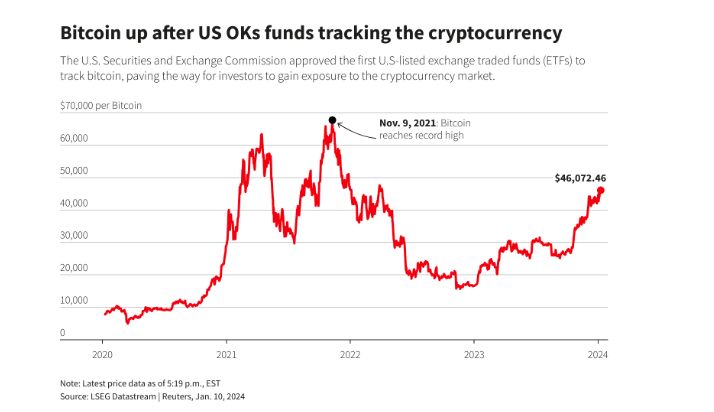In Wake of ETF Approval, Bitcoin Worldwide Matures
Now that Bitcoin has placed a new feather in its cap for relations with the United States government and their financial regulatory regime with the ETF approval, countries on every continent are seeking new ways to define their relationship to Bitcoin’s rising star.
The Securities and Exchange Commission in the US finally resolved a protracted battle with Bitcoiners when it approved 11 Spot ETFs on January 10. Although the actual launch of the ETF has been somewhat messy for bitcoin, from a price standpoint, it still nevertheless represents an unreserved triumph. The days when federal regulators treated Bitcoin with disdain and suspicion are now over: Even if regulators do scoff at what they see as a risky asset, Bitcoin is too strong for anyone to look down at it. Bitcoin is accepted in the financial infrastructure of its presumed country of origin, and it’s a move that’s only been possible with strong and long-lasting support.
Much ink has been spilled about the impact of the ETF on the US market, but Bitcoin is a worldwide movement. The sustained and dramatic growth in bitcoin’s valuation throughout much of 2023 was a consequence of the ETF campaign gaining steam, and that hype has been felt worldwide. Even if Bitcoiners in Hong Kong or Nigeria may not be able to invest in the ETF, they certainly have noticed the ETF’s ability to pump up bitcoin in their own countries. One particular beneficiary of this worldwide bonanza has been El Salvador, which made history in 2021 by choosing to adopt bitcoin as a new legal tender. Although this move was initially lambasted, the nation’s material investments in bitcoin have made a solid profit by January 2024. El Salvador has chosen to double down and then double down again as far as the world’s leading digital currency is concerned, and this boom cycle is no different: Within the last month, it has already made the groundbreaking pledge to offer citizenship to foreign bitcoin investors.
The bet paid off for El Salvador, and the nation has no signs of stopping. Moves like this offer of citizenship work to build bridges in the sphere of business, but the government has also been working on its political relationships vis-a-vis Bitcoin. After libertarian ideologue Javier Milei was elected the new president of Argentina, El Salvador immediately assembled diplomatic efforts to encourage the new president’s nascent interest in Bitcoin.
Now that Bitcoin has placed a new feather in its cap for relations with the United States government and their financial regulatory regime with the ETF approval, countries on every continent are seeking new ways to define their relationship to Bitcoin’s rising star.
The Securities and Exchange Commission in the US finally resolved a protracted battle with Bitcoiners when it approved 11 Spot ETFs on January 10. Although the actual launch of the ETF has been somewhat messy for bitcoin, from a price standpoint, it still nevertheless represents an unreserved triumph. The days when federal regulators treated Bitcoin with disdain and suspicion are now over: Even if regulators do scoff at what they see as a risky asset, Bitcoin is too strong for anyone to look down at it. Bitcoin is accepted in the financial infrastructure of its presumed country of origin, and it’s a move that’s only been possible with strong and long-lasting support.
Much ink has been spilled about the impact of the ETF on the US market, but Bitcoin is a worldwide movement. The sustained and dramatic growth in bitcoin’s valuation throughout much of 2023 was a consequence of the ETF campaign gaining steam, and that hype has been felt worldwide. Even if Bitcoiners in Hong Kong or Nigeria may not be able to invest in the ETF, they certainly have noticed the ETF’s ability to pump up bitcoin in their own countries. One particular beneficiary of this worldwide bonanza has been El Salvador, which made history in 2021 by choosing to adopt bitcoin as a new legal tender. Although this move was initially lambasted, the nation’s material investments in bitcoin have made a solid profit by January 2024. El Salvador has chosen to double down and then double down again as far as the world’s leading digital currency is concerned, and this boom cycle is no different: Within the last month, it has already made the groundbreaking pledge to offer citizenship to foreign bitcoin investors.
The bet paid off for El Salvador, and the nation has no signs of stopping. Moves like this offer of citizenship work to build bridges in the sphere of business, but the government has also been working on its political relationships vis-a-vis Bitcoin. After libertarian ideologue Javier Milei was elected the new president of Argentina, El Salvador immediately assembled diplomatic efforts to encourage the new president’s nascent interest in Bitcoin.


usersUpvoted
answersCount